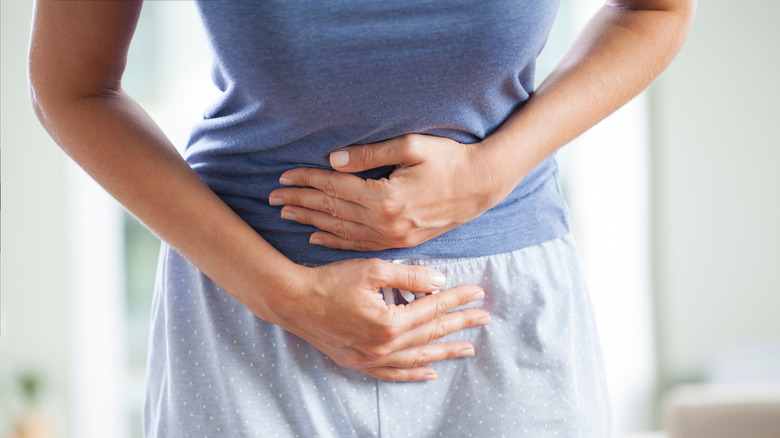Making Some Changes To Your Diet Could Help Relieve 'Endo Belly' Symptoms
According to Healthline, the term "endo belly" is used to describe the stomach symptoms that people suffering from endometriosis experience. Endometriosis is a disorder that affects people with a uterus and occurs when the uterine lining grows outside of the uterus. Those who suffer from endometriosis, which is usually females in their reproductive years, often have infertility issues as well as heavy bleeding during periods. But beyond the hormonal struggles, endometriosis can also cause digestive and gastrointestinal issues like bloating, nausea, diarrhea, and "endo belly."
If you are wondering why you've never heard of the term "endo belly," you aren't alone. While a ton of women suffer from this, it is rarely discussed, and many people just deal with the symptoms, which can include a swollen belly (some say it resembles a pregnancy belly), gas pain, and nausea. But if you do suffer from "endo belly," there are ways to lessen the symptoms, and adjusting your diet can have a huge impact.
What can help with 'endo belly'?
"Endo belly" isn't just a bloated belly, it can also be super painful and add to the already uncomfortable symptoms of endometriosis. According to Maiden Lane Medical, people who suffer from "endo belly" often suffer not only physically, but mentally and emotionally as well. "Endo belly" occurs due to inflammation that is caused by endometriosis, and while there is still a lot more to be studied about it, there are a few ways you can help relieve symptoms.
There are a few things your doctor may do to help stop "endo belly," or at least make it better. According to Healthline, birth control pills are usually a first step if you aren't already taking them, as they can help regulate your hormones, thus lessening the symptoms. Your doctor may also prescribe GnRH, which blocks estrogen production, or danazol, which prevents certain hormones. More severe forms of "endo belly" can be treated with a surgical procedure called a laparoscopy, and for the most severe, a hysterectomy and oophorectomy can be performed. But before you dive into the world of medications and surgeries, you may first want to look at your diet.
Diet changes that can help 'endo belly'
If you are suffering from symptoms of endometriosis, specifically "endo belly," Dr. Karli Goldstein, DO, consulting surgeon and medical advisory board member for the Endometriosis Foundation of America, recommends consulting with a dietician, via Health. To help alleviate "endo belly" symptoms, a diet that avoids inflammatory foods is vital, but those foods are different for everyone. Most skilled dieticians will work with you on an elimination diet, seeing which foods trigger your symptoms and which are deemed safe.
If you want to try some at-home remedies for "endo belly," Healthline recommends staying away from red meat, alcohol, gluten, dairy, caffeine, and processed foods, as all of these are considered inflammatory, and while they may not be your specific cause of inflammation, they are a good first step. In addition, you'll want to try and follow a low FODMAP diet, increase your fiber, and sip on ginger or peppermint tea. If your symptoms do not subside at all after a few weeks of a new diet, you'll want to consult with your doctor to better understand your options.


